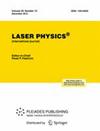How many sessions of quantum key distribution are allowed from the first launch to the next restart of the system?
IF 1.1
4区 物理与天体物理
Q4 OPTICS
引用次数: 0
Abstract
Quantum cryptography systems are systems for extending the initial start key, which is required at the start of the system, to ensure information-theoretic authentication of messages in the classical communication channel. In subsequent sessions, a quantum key is generated, part of which is used for authentication in subsequent sessions.从系统第一次启动到下一次重启,允许多少次量子密钥分发?
量子密码学系统是一种扩展初始启动密钥的系统,初始密钥在系统开始时是必需的,以确保经典通信信道中信息的信息论认证。在随后的会话中,会生成一个量子密钥,其中一部分用于随后会话的验证。量子密码学有一个基本问题--量子密钥分发(QKD)可以进行多少次,直到量子密钥的密码学特性达到临界水平,之后就不能再用于密码学目的,需要重新启动量子密码学系统。我们得到了量子密钥分发的允许会话数的明确表达式。结果表明,对于系统的实际参数,系统几乎可以无限期地工作,直到下一次初始化。
本文章由计算机程序翻译,如有差异,请以英文原文为准。
求助全文
约1分钟内获得全文
求助全文
来源期刊

Laser Physics
物理-光学
CiteScore
2.60
自引率
8.30%
发文量
127
审稿时长
2.2 months
期刊介绍:
Laser Physics offers a comprehensive view of theoretical and experimental laser research and applications. Articles cover every aspect of modern laser physics and quantum electronics, emphasizing physical effects in various media (solid, gaseous, liquid) leading to the generation of laser radiation; peculiarities of propagation of laser radiation; problems involving impact of laser radiation on various substances and the emerging physical effects, including coherent ones; the applied use of lasers and laser spectroscopy; the processing and storage of information; and more.
The full list of subject areas covered is as follows:
-physics of lasers-
fibre optics and fibre lasers-
quantum optics and quantum information science-
ultrafast optics and strong-field physics-
nonlinear optics-
physics of cold trapped atoms-
laser methods in chemistry, biology, medicine and ecology-
laser spectroscopy-
novel laser materials and lasers-
optics of nanomaterials-
interaction of laser radiation with matter-
laser interaction with solids-
photonics
 求助内容:
求助内容: 应助结果提醒方式:
应助结果提醒方式:


